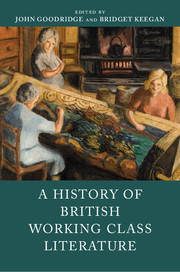Book contents
- A History of British Working Class Literature
- A History of British Working Class Literature
- Copyright page
- Contents
- Figures
- Contributors
- Foreword
- Acknowledgments
- Introduction
- Chapter 1 When “Bread Depends on Her Character”
- Chapter 2 “Stirr'd up by Emulation of the Famous Mr. Duck”
- Chapter 3 The Verse Epistle and Laboring Class Literary Sociability from Duck to Burns
- Chapter 4 “But Genius is the Special Gift of God!”
- Chapter 5 Alexander Wilson
- Chapter 6 Neither Mute nor Inglorious
- Chapter 7 “British Bards”
- Chapter 8 “Behold in These Coromantees / The Fate of an Agonized World”
- Chapter 9 Transnational Ulster and Laboring Class Self-Fashioning
- Chapter 10 Working Class Poetry and the Royal Literary Fund
- Chapter 11 The Life of William Cobbett
- Chapter 12 John Clare's Agrarian Idyll
- Chapter 13 “And aft Thy Dear Doric aside I Hae Flung, to Busk oot My Sang wi’ the Prood Southron Tongue”
- Chapter 14 “The Guilty Game of Human Subjugation”
- Chapter 15 At the Margins of Print
- Chapter 16 The Newspaper Press and the Victorian Working Class Poet
- Chapter 17 Tensions, Transformations, and Local Identity
- Chapter 18 On the Road
- Chapter 19 Ethel Carnie Holdsworth
- Chapter 20 “The Young Men of the Nation”
- Chapter 21 Kathleen Dayus
- Chapter 22 “It Have a Kind of Communal Feeling with the Working Class and the Spades”
- Chapter 23 Clannish Confines
- Chapter 24 A Critical Minefield
- Chapter 25 Transforming Working Class Writers and Writing
- Afterword
- Works Cited
- Index
- References
Works Cited
Published online by Cambridge University Press: 04 May 2017
- A History of British Working Class Literature
- A History of British Working Class Literature
- Copyright page
- Contents
- Figures
- Contributors
- Foreword
- Acknowledgments
- Introduction
- Chapter 1 When “Bread Depends on Her Character”
- Chapter 2 “Stirr'd up by Emulation of the Famous Mr. Duck”
- Chapter 3 The Verse Epistle and Laboring Class Literary Sociability from Duck to Burns
- Chapter 4 “But Genius is the Special Gift of God!”
- Chapter 5 Alexander Wilson
- Chapter 6 Neither Mute nor Inglorious
- Chapter 7 “British Bards”
- Chapter 8 “Behold in These Coromantees / The Fate of an Agonized World”
- Chapter 9 Transnational Ulster and Laboring Class Self-Fashioning
- Chapter 10 Working Class Poetry and the Royal Literary Fund
- Chapter 11 The Life of William Cobbett
- Chapter 12 John Clare's Agrarian Idyll
- Chapter 13 “And aft Thy Dear Doric aside I Hae Flung, to Busk oot My Sang wi’ the Prood Southron Tongue”
- Chapter 14 “The Guilty Game of Human Subjugation”
- Chapter 15 At the Margins of Print
- Chapter 16 The Newspaper Press and the Victorian Working Class Poet
- Chapter 17 Tensions, Transformations, and Local Identity
- Chapter 18 On the Road
- Chapter 19 Ethel Carnie Holdsworth
- Chapter 20 “The Young Men of the Nation”
- Chapter 21 Kathleen Dayus
- Chapter 22 “It Have a Kind of Communal Feeling with the Working Class and the Spades”
- Chapter 23 Clannish Confines
- Chapter 24 A Critical Minefield
- Chapter 25 Transforming Working Class Writers and Writing
- Afterword
- Works Cited
- Index
- References
- Type
- Chapter
- Information
- A History of British Working Class Literature , pp. 419 - 454Publisher: Cambridge University PressPrint publication year: 2017



